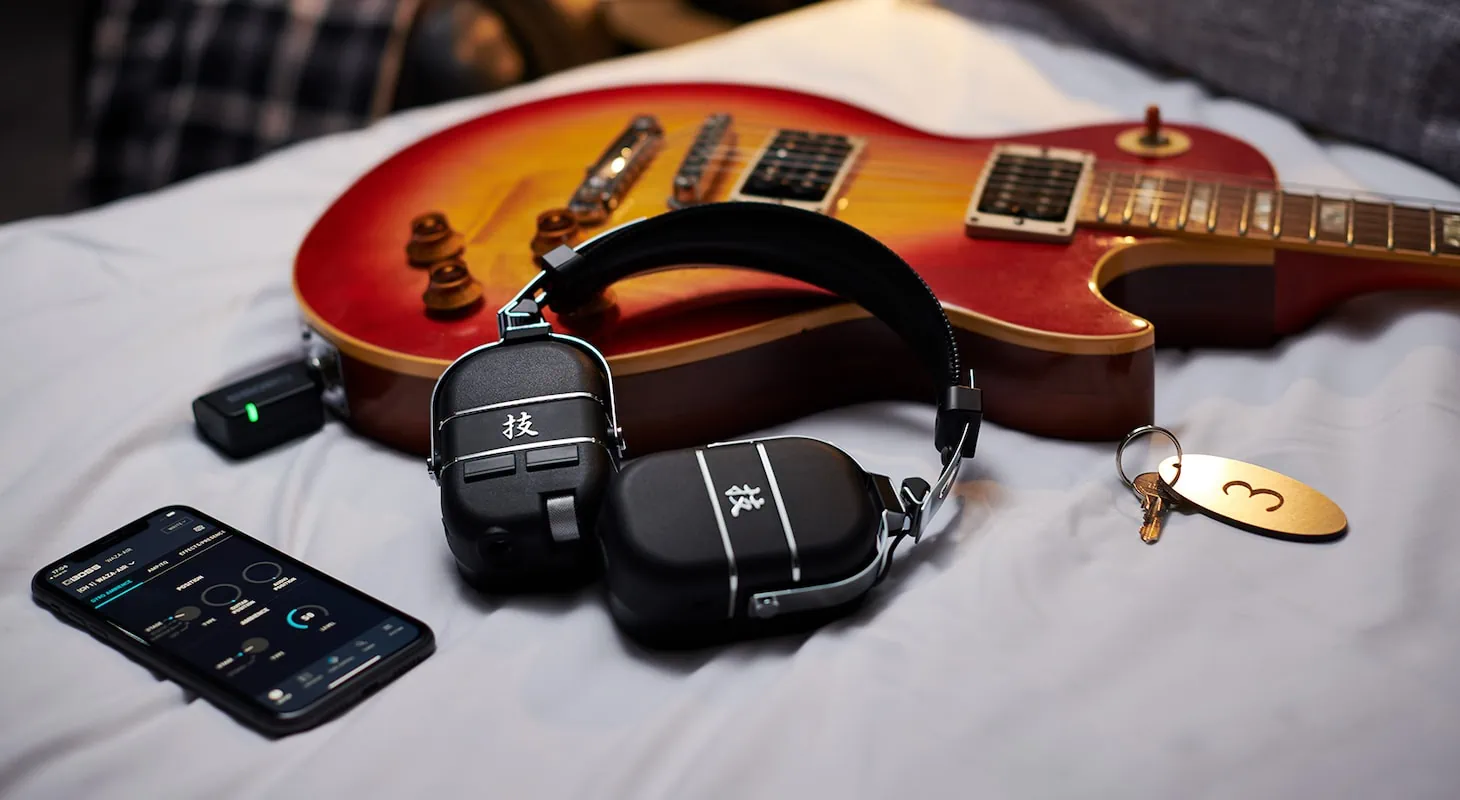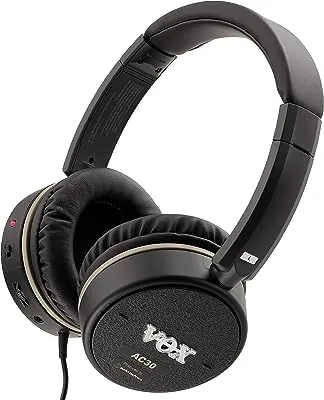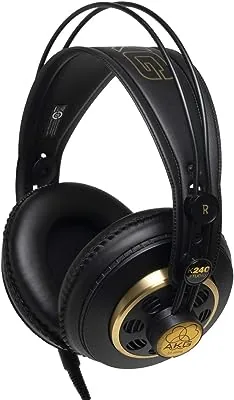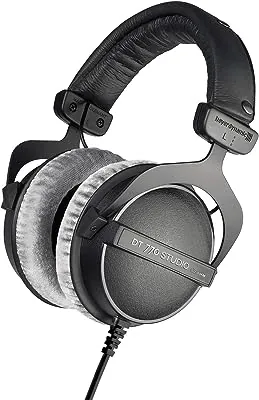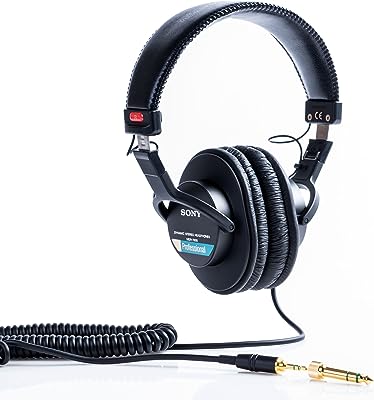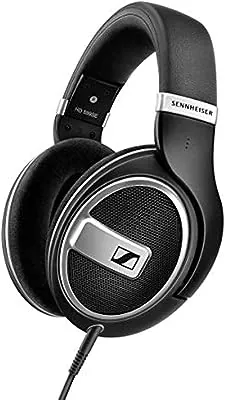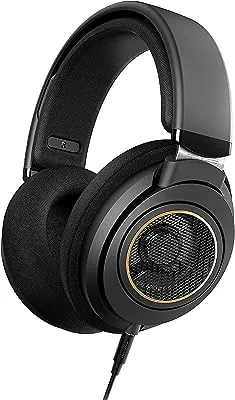I have many amazing memories from my time at Berklee College of Music in Boston! Walking around the halls was always cool, except when I had to pass by the guitar department practice rooms in the main building to get to the piano practice rooms.
That walk was a real drag because the sound coming from the guitar rooms was a total nightmare. Imagine walking into a music store and hearing five different renditions of "Stairway to Heaven" being played at the same time, but multiplied by 80!
After putting up with this for several months, I begged my professor to let me use the upper-level piano building. Things were going great until my second-semester roommate moved in with a huge Fender amp. He'd try to practice with headphones but they were so bad that the leakage was even more annoying.
Top 3 - Headphones for Guitar Amp
Preview | Product | Price |
|---|---|---|
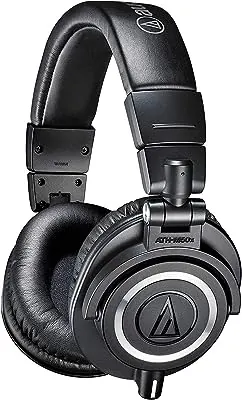 | ||
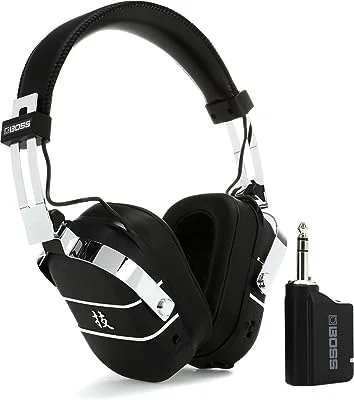 | ||
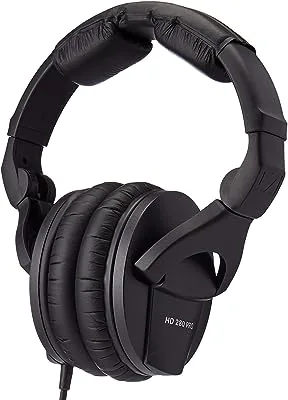 |
Fortunately, guitar headphones have greatly improved, allowing guitar players to experience the same quietness that piano players felt when they discovered the digital piano. If only these headphones had existed back then!
Here are some of the best headphones for peaceful guitar practice and recording session preparation.
9 of the Best Headphones for Guitar Practice!
1. Audio-Technica ATH-M50x
Audio-Technica has quickly become one of my favorite brands for studio headphones. And their ATH-M50x headphones do not disappoint for guitar practice!
These headphones are perhaps the best studio headphones for guitar players available. They boast an impressive frequency response of 15 Hz to 28 kHz. This is great because it allows you to fully appreciate the tone of your guitar and all of its various tonal features when using the built-in effects that modern and vintage amps offer.
So, the reason these headphones have such impressive frequency response is that AT used 45 mm drivers with rare earth neodymium magnets in their design. And if you've read my other reviews and articles, you know I'm not a fan of hyped frequency responses, but these are tuned for flat response, which means they're super accurate across the entire range.
I've used these when I'm setting up guitars for sessions and need to focus on dialing in the right sound with the whole band playing around me. The design of the contours around the ears is amazing for sound isolation. Even if I'm 5 feet from the drummer, I can still work on the guitar tone without any interruptions.
Guitar players have also given these headphones rave reviews, especially the nice low end when using seven-string or baritone guitars.
One really cool feature is that they're foldable and come in a nice drawstring bag, making them easy to take back and forth from home to the studio.
But, if I had to complain about one thing, it's the detachable cable. I can't tell you how many times I've gone home with headphones with detachable cables only to realize I forgot the cable at the studio. I'm sure I'm not the only one that's happened to, right?
2. Boss Waza-Air
Boss has been creating guitar effects for ages, so it's no surprise that they've come up with a smart way to practice the guitar without having to carry an amp everywhere. The Waza-Air wireless guitar headphone amp is a smooth way to plug in and move around.
It has high-quality headphones with 50mm drivers and a low-latency wireless transmitter. You don't even need to worry about carrying an instrument cable around, like in the days of those weird IK Multimedia iRig setups. Do you remember those?
One of the coolest features is Bluetooth compatibility. You can stream songs and play along with them. If you're a guitar player of my generation, this would have been a dream come true.
Of course, no guitar practice system would be complete without some nice Boss effects. They didn't only include amps but also effects from their Katana amplifiers, which are really lovely.
They could have stopped there, but they went one step further and created an app called the Boss Tone Studio app, where you can store presets.
I checked out the app and had a blast creating various presets for different genres. I had one for clean, one for jazz, one for classic rock, one for metal, and so on. It was so much fun!
These must be the best guitar practice headphones out there. They might have earned that title from the Bluetooth streaming alone, but the fact that they included an onboard tuner is just mind-blowing.
The only issue that I wasn't thrilled with is that the device runs on a rechargeable lithium battery that only lasts for five hours of playtime. I'm not a fan of lithium batteries for wireless devices because they can't be easily swapped out.
3. Sennheiser HD 280
Sennheiser and Audio-Technica are like head-to-head rivals when it comes to the best studio headphones. The HD 280 headphones are just gorgeous and they really stand out when it comes to transient response.
Now you might be wondering, "What's transient response got to do with guitar? It's not exactly a percussion instrument or a production tool." But I feel like being able to really listen to the detail of the guitar strings, their plucking, and overall rhythm actually helps you stay in time.
That's super important when you're practicing. From my experience, a lot of young guitar players tend to rush ahead of the beat when they're playing fast passages.
I think that's partly because unlike drummers and piano players, who are very tuned to the attack quality of their instruments, electric guitar players sometimes get lost in the effects.
These headphones also have excellent frequency response, just like the Audio-Technica ones. They go from 8 Hz to 25 kHz, so a little bit lower but slightly less high.
I don't think guitar players really need to go down to sub-harmonic levels like that, but it’s good for tracking.
I've used these headphones in a couple of sessions and also in practice, and I really dig their overall sound. To my ears, they're a little bit heavy on the bass.
It doesn't affect your natural guitar tone as much, but if you start adding some pedals to your setup, it could get a little muddy on the low end.
One thing I do have to say is that these headphones are incredibly comfortable for practicing long hours - probably the most comfortable headphones that I've worn practicing guitar. They're not as heavy, which is a plus.
4. Vox AC30
The Vox AC30 is a cool set of headphones designed for practicing guitar. They are modeled after the famous Vox AC30 Tweed amp that the Beatles made famous back in the day.
The best part is that these headphones are easy to use. You don't need to connect them to anything else to get your sound going. Just plug your guitar straight into the headphones, and you're good to go.
Plus, like the Boss Waza-Air, you can add some effects. There are three classic options to choose from: chorus, delay, and reverb.
One great thing about the Vox AC30 is that they run on AAA batteries instead of lithium-ion. That's a huge plus if you're comparing them to the Boss Waza-Air.
You can even listen to your favorite tunes with these headphones. Just plug your phone or other device into the port on the cup, and you're ready to roll.
However, there is some background noise that comes through when you use the auxiliary port. It's not the end of the world, but it's something to keep in mind.
Personally, I think Bluetooth is way better when it comes to sound quality. Have you ever tried to play music from your iPhone through one of those old-school aux inputs in your car? It's rough. So the fact that these headphones use an auxiliary port is kind of outdated, in my opinion.
All in all, the sound quality of the Vox AC30 is decent, but it's not going to blow your mind. That being said, if you're looking for convenience when you're on the go, these headphones are the way to go.
Just plug them in and start jamming. It's simple and effective.
5. AKG K240
AKG is one of the heavyweights in Europe when it comes to top-notch microphones and headphones. I have these AKG K240 in the live room for all my guitar players, singers, and instrumentalists.
When it comes to recording guitar, getting the right rhythm or solo part can take numerous takes. Therefore, comfort is key.
The AKG K240 are the ideal headphones for guitar players because they won't cause discomfort after hours of use. The adjustable band is great because it minimizes the weight on your head.
Additionally, their semi-open back design makes them lighter and more comfortable for your ears. I would name these the most comfortable headphones for guitar.
And don't even think about sacrificing quality, these headphones have incredible acoustic isolation and a frequency response from 15 Hz to 25 kHz. That's up there with the competition.
Oh, and one more thing, they have replacement ear cups available. I mean, let's be real, when you're jamming for hours in a room full of musicians, you're going to get sweaty and could eventually ruin your headphones.
Now, here's the deal with their sound. Personally, I find them a little bright. It's not necessarily that they're hyped, it's just their technology, which is a high-quality low-impedance transducer, that actually over-accentuates highs to my ears.
They sound pretty cool when you're singing, mixing, or playing along to Spotify, but for guitar amps only, they could be a bit too bright for some people.
It all comes down to personal taste of course.
6. Beyerdynamic DT 770 Pro 80
Okay, so the Beyerdynamic DT 770 headphones are probably the most high-fidelity headphones in the group. They've got an insane frequency response of 5 Hz to 35 kHz. But, scientifically speaking, the human ear can only hear sounds between 20 Hz and 20 kHz.
Are the specs snake oil? Nah. It means that they can translate overtones and subharmonic low end better. Overtones are a big part of guitar amp recording and practicing because lots of guitar amp recordings have a fair amount of distortion.
In my case, I even use a SansAmp pedal before the actual amp to add extra boost and crunch. So, the richness of your sound when playing guitar has to do with how you hear the overtones and harmonics.
I wrote an article about this subject if you want to read more about it in detail. Concerning guitar, when dialing in really good distortion settings, the more highs you can hear, the better. That goes for balancing pedal board effects chains as well.
The cool thing about headphones like the DT 770 is that they are tailored and frequency-cued to diffuse field EQ effects. This means that even though you get some incredibly expanded high-end, it won't hurt your ears or affect your hearing. It will be the "air" that engineers and producers leave as a reference.
The only bummer about these headphones is that, although they're comfy, they do seem to be a little heavy around your ears and may cause some serious fatigue, which nobody wants.
7. Sony MDR-7506
Everyone knows Sony, right? They've been making some of the best home theater and even pro-grade studio equipment for decades. To me, Sony is a brand that audio enthusiasts can still take seriously.
Their MDR-7506 headphones are great for listening to music. When you put them on, everything sounds so immersive. It's almost like you're in a surround sound system.
I have to say, these headphones are also great for playing guitar. I always thought of them as more for mixing or vocals. But a couple of years ago, a friend of mine who's a guitar player used a pair while recording at Capitol Records. She's been using them ever since.
I asked her what made her use them for guitar, and she said that when she's dialing in some of her Eventide and streaming effects, she really wants to hear the full spectrum. It's almost like she's listening to them through professional studio monitors.
I tried it, and I totally get what she's saying. If you're into sound design and ambient-style guitars, these headphones might be the best for guitar amp effects.
If you're a fan of artists like Daniel Lanois, Radiohead, Pink Floyd, and Blur, then these headphones are perfect for you. A lot of people don't realize how difficult it is to dial in complex effects for guitar, both for practice and performance. Having great headphones definitely helps.
The only downside is that Sony's strength is also its weakness. The headphones sound so beautiful that they aren't exactly accurate. So, if you're going to record, make sure you double-check that the engineer is hearing what you're hearing. But for playing live, I don't think it makes that big of a difference.
8. Sennheiser HD 599
When I'm making beats, I always go for my trusty Sennheiser headphones. DJs and beatmakers all swear by them. And get this, they're pretty sweet for guitar too!
If I had to compare the HD 599 to something else, it would be the Sony headphones, which are maybe a little less natural-sounding. That's not a huge deal for practicing, but when it comes to recording, the Sonys might be a better choice.
Now, if you're into modern music and want to jam out with your guitar, then these headphones are definitely going to be your best bet. They have a way of letting every instrument in the mix occupy its own space, including your guitar.
So even if you're playing along to songs with heavy bass and powerful beats, your guitar will still shine through. They really shine for transients and power.
And here's another important thing to remember: wearing these headphones won't fatigue your ears. When you're practicing, it's easy to get worn out from hearing the same thing over and over again. But with the Sennheisers, the separation between the track and your guitar's sound is just right.
Oh, and did I mention that Sennheiser knows you'll be jamming along to your devices? That's why they included converters for different types of playback systems. How cool is that?
Now, the only downside I can think of when it comes to Sennheiser headphones is that they seem to focus more on the lows and punch, and not so much on the highs. It's not a huge deal if you're just practicing with your guitar and amp, but if you're using a ton of crazy effects, it might be something to keep in mind.
9. Philips SHP9600
Alright, let's talk about the Philips SHP9600 studio monitor headphones. Now, I know what you're thinking - Philips, the home appliance company? Yeah, they make screwdrivers too. But don't be too quick to judge because these headphones are pretty sweet.
When it comes to sound quality, I'd put them up there with Beats by Dr. Dre or Audeze. They have a super cool open-back design, and the 50mm driver delivers a modern, crisp sound that's surprisingly professional.
These headphones are made with professional-grade quality, using neodymium magnets to give you that bold guitar presence. They're perfect for jamming along with your Spotify tracks or mastered mixes, which is where they really shine.
They're super comfy and well-designed, from the gold-plated adapters to the reinforced headband, showing that a lot of care and quality went into making these headphones. As someone who spends hours practicing with a guitar amp, I love it when headphones are comfortable.
Even though the guitar isn't my first instrument, I picked it up about 5 years ago when I started doing more film scoring. One of my specialties is creating sound design with guitars. That's why headphones are important; when you use a lot of effects, you have to monitor the noise closely. These headphones are great for that.
However, these headphones are a bit heavier than some of the others we've talked about, weighing in at just under 3/4 of a pound. Now, I used them for a 55-minute session and felt fine, but some folks might feel the weight after longer sessions. Just for reference, I've used the AKGs and Sennheisers for up to 34 hours straight without feeling fatigued.
Choosing the Best Guitar Headphones for Practice Sessions

When it comes to picking the best headphones for guitar amp, you have to consider your practice routine and overall session or rehearsal routine. If you jam along with mastered tracks on popular streaming platforms, then you should definitely go for Bluetooth-enabled or streaming-capable wireless headphones.
This is especially important if you need to practice your guitar anywhere with complete freedom, even outdoors, when you're taking a break from your day job.
Another thing to consider is if you're a more professional session player and you want headphones that not only deliver power but can also isolate your sound. This is especially helpful if you're trying to get a good balance before a recording session and everyone is making noise around you.
Some of the more isolating headphones also seem to have a more immersive and detailed sound, making them ideal for guitar recording in studios.
Here are a few things to think about when choosing the right guitar amp headphones:
Traditional vs. Guitar Specific
Out of the headphone brands in this roundup, only Boss and Vox are guitar-specific. However, the other seven headphones are still great for finding the perfect tone and practicing guitar.
If you had to choose just one type of headphone, what's more important: having a professional overall sound or having a full recording studio for guitar right in your ears?
Personally, I wouldn't go for the loaded headphones with amp simulators. It's not that hard to use a tiny laptop setup if you want to practice with emulations of guitar amps.

Do you remember the Line 6 Pod? It suffered from the same dilemma. While it was convenient as a gadget to replace your amp for mobile practice, it just didn't sound that good and made you lazy.
I believe that a part of practicing is getting to know your amp and effects, and dialing in better sounds. Aside from woodshedding your chops, that is where you should spend your time, with your amp.
Another reason why I'd steer clear of the amp simulator headphones is that great amps are still very hard to replicate in software. So, for me, the ultimate setup would be a great pair of headphones with a great small amp - it just sounds better.
Connectivity
Being able to route your music player to your headphones, whether it's an iPhone, iPad, or a groove box sampler, is an awesome way to practice guitar. I used to do this back in my college days, but it was a bit of a pain to plug everything into a mixer and then plug my headphones into the mixer.
But I did it anyway because jamming along to the songs I was transcribing or learning was super important to me.
Nowadays, there are even apps that allow for wireless Bluetooth streaming to headphones, like the Boss Waza-Air. This makes non-traditional guitar-specific wireless headphones a more tempting option.
It all depends on how much you think you'll use those features though.
Plus, with a nice pair of headphones, you're not limited to just using them for guitar. Although for this article, I'm mainly focusing on headphones that are great for guitar amp practice over mixing and recording.
Sound
When it comes to headphones, they have to sound great. There's no point in settling for mediocrity when there are so many amazing choices out there.

Sony MDR7506 Headphones
As for the Vox headphones, they're a decent option for jamming and having fun, but they might not be the best choice if you're looking for headphones to use seriously for other professional tasks.
It's important to think about what you'll be using them for and choose a product that fits the bill.
Also, splurging on a pair of professional-grade headphones can be a smart move in the long run since they're built to last longer and provide better sound quality, which will make your overall listening experience even better.
Final Thoughts
As someone who plays the keyboard, I've always been a bit envious of guitar players. They have it so easy, being able to move around with a small setup and still use their main instrument.
As a pianist, it always felt like I had to make do with a digital piano or a synthesizer if I wanted to write songs, practice, or perform.
But now, with these awesome headphones for guitar amps, things just got a whole lot better! These nine pairs of headphones capture all the subtleties of nitrous tubes, amps, great guitars, and a few effects here and there, giving you the full sound of a guitar and pedalboard setup.
A couple of these ARE the pedalboard!
Even to this day, unless I'm using a computer with a fantastic controller and great sample libraries or lugging around a heavy 88-key workstation, I can't take the experience of playing a real piano with me wherever I go.
That's why I'm excited for all my fellow guitar players out there to check out some of these incredible headphones and have a blast. May you practice in peace!

